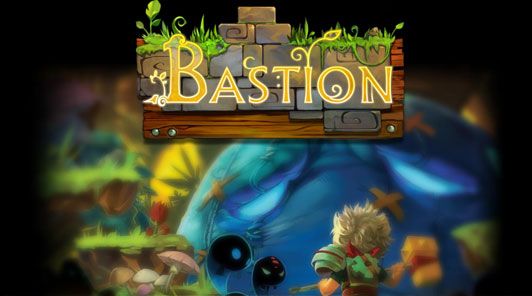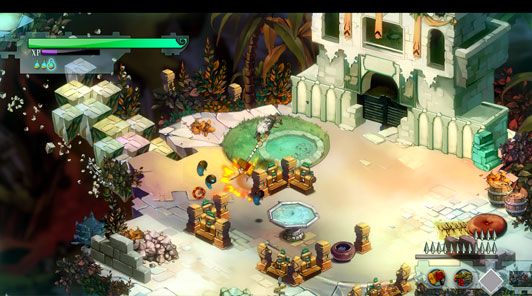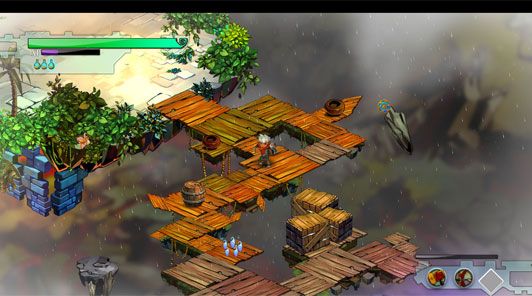Saying goes that a proper story starts at the beginning. This one ain’t any different. Not all video games roll out to store shelves full of glitz and glamor, backed by big studios with lots of cash. Some are quiet affairs. Some are carefully assembled by a small, tight-knit group of fine people with a singular vision and talent coming out their ears. Don’t let the name fool you. Supergiant Games is anything but, ‘cept in the dreams department. It’s those dreams, after all, that gave us Bastion.

Bastion’s set in Caelondia. It was a nice enough city, once. Plenty of innovation, opportunity for those after it, haves and have-nots, just like any city. It was nice enough, before the Calamity hit. Nobody really saw it coming. Sure there were rumors of new hostilities between Caelondia and the people out past its walls, the Ura, but nobody expected this. Nobody expected the world to just stop working the way it should. Nobody expected the land to all but disappear, bits of it floating in great seas of empty air. Nobody expected any of it, least of all the Kid.
Don’t know if he’s got a proper name, or if we’re supposed to saddle him with one. He’s the first warm body we meet in Bastion, though, and just about every move he makes is narrated. Good thing, too. Things are a bit violent and chaotic in the wake of the Calamity. All sorts of beasts, creatures, and foes come at the Kid from all sides. We watch the whole thing from above as he goes to work on all comers with a variety of tools, long arms, and some really interesting surprises. He’s capable, this Kid, but he ain’t the only survivor of the Calamity.

He’s got a mean swing.
I mentioned his actions are narrated, right? Turns out the narrator’s a character, too. Goes by the name of Rucks, kind of a seasoned older fella with plenty of stories of his own. Seems that way, at least, but his focus is on the Kid. Even as the Kid rolls, blocks, fights, and explores, Rucks is filling us in on what Caelondia was like before the Calamity, what the Kid’s coming up against, and how the Bastion can fix things up. Right, almost forgot. The game takes its name from your home base, a sort of last-resort refuge for folks from Caelondia who could make it out of the Calamity. Not that many did.
When the Kid does find survivors, their stories get told, too. Rucks ain’t shy in that regard. Takes a little doing to get all the details, but it’s definitely worth it. As the Kid’s doing his thing, he’s earning back parts of the world, which he brings to the Bastion and changes into upgrades for his weapons, improvements to the Bastion itself, even fresh bottles of spirits from Rucks’ private stock. The best thing about all of this is how seamless it is. Other places might see you moving from story to gameplay to upgrades and back again with audible clacks and clunks. Not Bastion. If it’s got seams, they’re pretty stylish ones.

Calamity really tore things up. Down to the Kid to make it right.
Normally this’d be where someone like me’d do a summation of the experience, lay out likes and dislikes, maybe even tack on some arbitrary number. But I ain’t gonna do that to ya. Not this time. This is different, and deserves different treatment. It’s a fine tale as well as a fun and challenging distraction, well worth your time and effort to seek out. Art’s gonna pull you in. Music’s gonna stick with you. Best of all is that it’s available to ya just about any way you please. Consoles, digital distribution, hell, you could buy it through Chrome and play it literally anywhere. So what’re you waiting for? Find your way to the Bastion.
Story like this ain’t gonna tell itself. You gotta make yourself a part of it.



May 9, 2012 at 7:12 am
Bastion’s managed to grow into one of my favorite games a little while after playing it. It took some time to start, but when the story really starts kicking in, it won’t let go.
One of the most impressive feats, for me at least, was that they managed to throw in several challenge modes that still connected to the story. Filled out the background behind the characters, with Rucks telling you about everyone’s past after each wave.
And that soundtrack. Whoever thought it better to lay the tracks around and play them as appropriately to the situation like a movie soundtrack rather than just using them as stage themes is a genius.